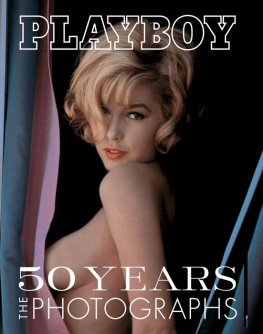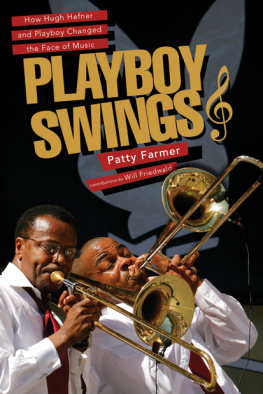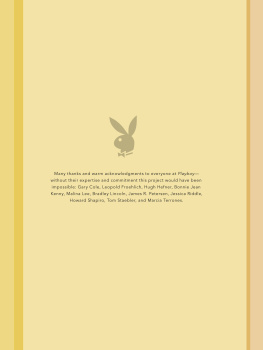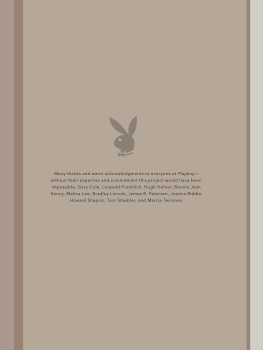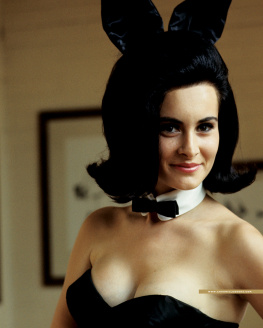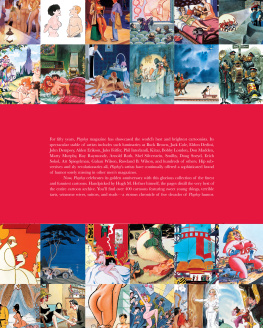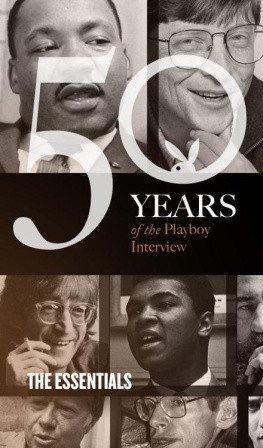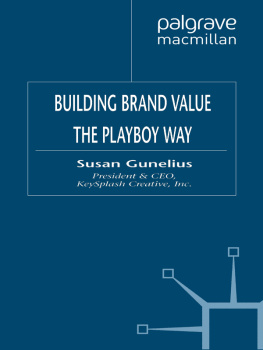Playboy - The Playboy Interview: Sports Gods: 50 Years
Here you can read online Playboy - The Playboy Interview: Sports Gods: 50 Years full text of the book (entire story) in english for free. Download pdf and epub, get meaning, cover and reviews about this ebook. year: 2012, publisher: Playboy Enterprises, Inc., genre: Detective and thriller. Description of the work, (preface) as well as reviews are available. Best literature library LitArk.com created for fans of good reading and offers a wide selection of genres:
Romance novel
Science fiction
Adventure
Detective
Science
History
Home and family
Prose
Art
Politics
Computer
Non-fiction
Religion
Business
Children
Humor
Choose a favorite category and find really read worthwhile books. Enjoy immersion in the world of imagination, feel the emotions of the characters or learn something new for yourself, make an fascinating discovery.

- Book:The Playboy Interview: Sports Gods: 50 Years
- Author:
- Publisher:Playboy Enterprises, Inc.
- Genre:
- Year:2012
- Rating:5 / 5
- Favourites:Add to favourites
- Your mark:
- 100
- 1
- 2
- 3
- 4
- 5
The Playboy Interview: Sports Gods: 50 Years: summary, description and annotation
We offer to read an annotation, description, summary or preface (depends on what the author of the book "The Playboy Interview: Sports Gods: 50 Years" wrote himself). If you haven't found the necessary information about the book — write in the comments, we will try to find it.
Playboy: author's other books
Who wrote The Playboy Interview: Sports Gods: 50 Years? Find out the surname, the name of the author of the book and a list of all author's works by series.
The Playboy Interview: Sports Gods: 50 Years — read online for free the complete book (whole text) full work
Below is the text of the book, divided by pages. System saving the place of the last page read, allows you to conveniently read the book "The Playboy Interview: Sports Gods: 50 Years" online for free, without having to search again every time where you left off. Put a bookmark, and you can go to the page where you finished reading at any time.
Font size:
Interval:
Bookmark:
CONTENTS
About the Book
Copyright 2012 Playboy Enterprises, Inc.
All rights reserved, including the right to reproduce this interview or portions thereof in any form whatsoever. For the full Playboy archiveincluding every Playboy Interview ever publishedvisit i.playboy.com .
About the Series: In mid-1962, Playboy founder Hugh Hefner was given a partial transcript of an interview with Miles Davis. It covered jazz, of course, but it also included Daviss ruminations on race, politics and culture. Fascinated, Hef sent the writerfuture Pulitzer Prizewinning author Alex Haley, an unknown at the timeback to glean even more opinion and insight from Davis. The resulting exchange, published in the September 1962 issue, became the first official Playboy Interview and kicked off a remarkable run of public inquisition that continues todayand that has featured just about every cultural titan of the last half century.
To celebrate the interviews 50th anniversary, the editors of Playboy have assembled 13 compilations of the magazines most (in)famous interviewsfrom big mouths and wild men to sports gods and literary mavericks. Here is our collection of 12 interviews with the most booed and beloved athletes.
Joe Namath, December 1969
Last Januarys Superbowl victory by the New York Jets over the Baltimore Colts was by far professional sports most dramatic event since Bobby Thomsons ninth-inning home run won a pennant for the New York Giants 18 years ago. The Jet win was doubly meaningful: It not only proved that the American Football League had achieved parity with the older N.F.L.; it also vindicated Jet quarterback Joe Namath, who boasted before the game that his 17-point underdog team would vanquish the supposedly invincible Colts. In an era when athletes are no longer averse to publicly assessing their chances of victory, it seems ludicrous that Namaths cockiness could have so outraged the sporting world and the public at large, but it didand does. Namath scoffs at the selfless stoicism America demands from its athletes; his hedonistic, almost anarchic approach to life turns his fans on as sharply as it turns his detractors off. But at least one fact of Namaths life is beyond contention: He is easily the most flamboyantand probably the premierquarterback in football today.
He is also sports most publicized figure; seldom has America been as interested in an athlete as it is in Joe Namath. Transmogrified from grid superstar into cult hero, he now finds himself cast as a kind of Belmondo with a jockstrap. And Namaths off-the-field activitiescentering mostly on sexual conquestshave assumed the dimensions of modern myth; he is already rumored to have befriended and bedded more women than Casanova in his prime. Even his most irrelevant idiosyncrasiesgrowing a goatee, owning a black mink coat (which was stolen from him) or having a few drinkshave become causes cl bres in the popular press. That any young man should be the focal point of such approbation and abuse is remarkable; that it has happened to Joseph William Namath is truly extraordinary.
Certainly, nothing in Namaths background seems to have qualified him for the image hes acquiredand cheerfully accepted. Born on May 31, 1943, in Beaver Falls, Pennsylvania, a small steel town 30 miles west of Pittsburgh, Joe was the youngest of four sons in a Hungarian household that included an adopted daughter. His father was a steel-mill worker who, like many men in the area, wanted his boys to make it in the world through athletics. Joes brothers, all of whom were athletes, studiously schooled their kid brother, until, by the time he was 18, Namath had become an outstanding basketball, baseball and football player. And an unforgettable local character, as well: Namaths flashy skintight attire was topped off by a black beret, sunglasses and a toothpick carried jauntily in the right side of his mouth. In his senior yearthe only full season Joe played quarterback for Beaver Falls High Schoolhe completed 85 of 146 passes for 1564 yards, led his team to a Conference championship and had virtually every major college scout in the country hanging around the family home.
After a long selection process, Namath finally enrolled at the University of Alabama, where he was coached by Paul W. (Bear) Bryant, whoby reputation, at leastmakes the Washington Redskins disciplinarian Vince Lombardi seem a veritable brownie scoutmaster. In his sophomore season, Namath soon established himself as a quarterback par excellence by completing 76 of 146 passes and displaying the kind of deceptive ball-handling finesse that can be gained only through arduous practice. On the field, recalls Namath, the motto was kill or be killed. I worked for that man. I even played defense ; would you believe it? Anyone who knows Bryant, of course, would; on his office wall, there hangs a sign reading Winning Is Not Everything, But It Sure Beats Anything That Comes in Second. Bryant remembers Namath as a socially unsure youngster who matured enormously at Alabama: When Joe first came to our school, he was timid and shy. But he never lacked any confidence on the football fieldand by the time he left here, he was a well-poised young man. I think Joe is the most talented player Ive ever been around.
In his junior year, a maturing Namath showed he could think like a fox, run like a deerand drink like a fish: With several teammates, he broke the squad temperance rule one night and was promptly suspended for the last two games of the season. He made a mistake, Bryant said at the time, but if hes the kind of person I think he is, Joe will prove worthy of another opportunity. Namath accepted the suspension without involving the others with whom he had been drinking. Even though Bryant didnt really appreciate Namaths first goatee (Joe sensed his displeasure and shaved it off) nor the fact that Namath once began a frug on the side lines while a marching band performed on the field, the coach and his superstar grew steadily closer; and in his senior year, Namath went on to become an All-Americancompleting 64 percent of his passes on the gridiron and probably even more than that with Alabamas comely contingent of Southern belles. But Namaths continuing, whispered adventures as a Lothario only added to the heroic stature he had achieved throughout the state.
Though injured in the fourth game of the season, Namath grittily kept playing, despite a torn cartilage in his right knee; he wasnt about to let an injury squeeze him out of a fat professional contract. In practice several days before Alabamas 1965 Orange Bowl date with the University of Texas, Namaths damaged knee suddenly collapsed, and he was slated to sit out the game; but he was called on to play when the teams substitute quarterback couldnt get the offense moving. Joe responded by connecting on 18 of 37 passesand was named the Orange Bowls Most Valuable Player.
With the last game of his college career behind him, Namath began weighing offers from the two teams that had drafted himthe A.F.L. Jets and the N.F.L. St. Louis Cardinals. At the time, the leagues were involved in a talent-buying contest and the younger league, with little prestige to recommend it, had to put its money where its ambitions were. Sonny Werblin, then head of the Jets, was searching for a quarterback with a personality fans could latch onto. Said show-business-oriented Werblin (formerly president of the Music Corporation of America): I needed to build a franchise with somebody who could do more than just play. So we went down to Birmingham and the minute Joe walked into the room and lit it up, I knew he was our man. After much deliberation, Namath signed with New York for a reported $427,000.
He was rechristened Broadway Joe almost immediately, and comments about his unprecedented contract ranged from the caustic to the coy. (Said Bob Hope, Joe Namaths the only quarterback in history wholl play in a business suit.) Before entering the Sunday wars, however, Namath first had to enter Manhattans Lenox Hill Hospital for knee surgery. All the cartilage in Namaths right knee was removed, but the operation was a success. Soon afterward, he was found physically unfit for military service, and a huge public outcry erupted, with the result that Namath was reexaminedonly to flunk the physical again. How can I win, man? he said later. If I say Im glad, Im a traitor, and if I say Im sorry, Im a fool.
Font size:
Interval:
Bookmark:
Similar books «The Playboy Interview: Sports Gods: 50 Years»
Look at similar books to The Playboy Interview: Sports Gods: 50 Years. We have selected literature similar in name and meaning in the hope of providing readers with more options to find new, interesting, not yet read works.
Discussion, reviews of the book The Playboy Interview: Sports Gods: 50 Years and just readers' own opinions. Leave your comments, write what you think about the work, its meaning or the main characters. Specify what exactly you liked and what you didn't like, and why you think so.

